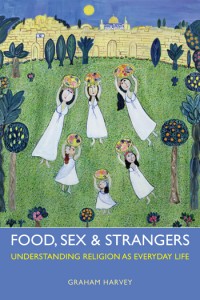For non-Muslims the word caliph might bring to mind Harun al-Rashid, a caliph who features in a number of the fantastical tales of The Thousand and One Nights, as well as in for instance poems by Alfred Tennyson (‘Recollections of the Arabian Nights’) and W.B. Yeats (‘The Gift of Harun al-Rashid’), and in James Joyce’s novel Ulysses. The office of caliph and the institution of the caliphate have a complex and fascinating history. The recent proclamation by Abu Bakr al-Baghdadi, leader of the Islamic State of Iraq and the Levant (ISIS), of a caliphate in Syria, prompted me to say a bit about this and comment on its current significance.
Category Archives: Ideas
Far from the madding crowd: Glastonbury’s spiritual side
 Here is Marion Bowman talking about the spiritual aspect of the Glastonbury festival: https://theconversation.com/far-from-the-madding-crowd-glastonburys-spiritual-side-28239 .
Here is Marion Bowman talking about the spiritual aspect of the Glastonbury festival: https://theconversation.com/far-from-the-madding-crowd-glastonburys-spiritual-side-28239 .
Money, austerity and debt
 On the 11th February in the midst of some of the most serious flooding the country has seen, Prime Minister David Cameron declared “money is no object”. Keen to justify ‘austerity’, Cameron had previously encouraged a household budget mentality that could count, save and spend a tangible and sensual money as a means of avoiding or erasing debt. To hear him speak of money as something intangible and beyond sensual apprehension forced pause for thought. So if money is “no object”, what is it?
On the 11th February in the midst of some of the most serious flooding the country has seen, Prime Minister David Cameron declared “money is no object”. Keen to justify ‘austerity’, Cameron had previously encouraged a household budget mentality that could count, save and spend a tangible and sensual money as a means of avoiding or erasing debt. To hear him speak of money as something intangible and beyond sensual apprehension forced pause for thought. So if money is “no object”, what is it?
Islamic finance has something to teach us all and may have more freedom to flourish here in the UK
During the last days of 2013 I found myself trying to explain to an old acquaintance why, although a non-Muslim myself, I have spent the last few years researching and writing about Islamic finance. Evidently I didn’t make a very good job of it, because eventually he pronounced that the only thing Islamic culture has ever contributed to the world is ‘some nice blue tiles’. Leaving aside any personal offence I may have taken, and without invoking the much disputed term Islamophobia (which I find problematic), this left me wondering why some people of Christian heritage seem so determined to deny that the Islamic tradition has anything to teach us at all. I believe that the area of finance and economics is one where an encounter with the Islamic tradition can be very rewarding for those not brought up in it.
Defining religion
Now and again, academics need to ponder the use of the words that appear to define their disciplines. Anthropologists have worried about “culture”, while “literature” has been debated in English. It isn’t that we claim ownership of particular topics, or that we think we have privileged access to phenomena that interest us. Usually the opposite is true. It’s possible to discuss everything as “culture” or “literature”. Scholars often revel in fertile debates when different disciplines say something provocative or fresh. Scholars of religion have been vigorously debating the meaning of the term “religion” recently. We’ve been considering where the boundaries lie between religion and whatever is “not religion”. Perhaps there are no boundaries. Those who are “not religious” (whether because they define themselves as “spiritual but not religious” or as atheists or secular humanists) often say or do things that clarify what it is that the study of religions focuses on.

